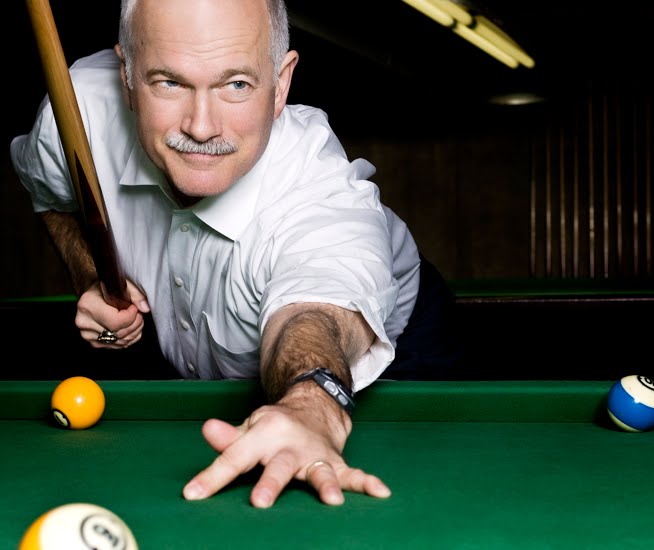In a country like ours, we have little history of participating in collective mourning. It is neither fashionable, nor rooted in our traditions. For nations are built on founding myths which often distort history and deny certain historical suffering.
Today, Jack allowed us to cry together, to feel together, to mourn together — to think of another world together.
This has never really been a nationalist country, and there is always a hint of nationalism tethered to collective mourning. But the passing of Jack Layton has brought the social democratic vision of the country in to the mainstream public consciousness today. In the genuine outpouring of sympathy across the political spectrum, there is something really magical at work. The expression of empathy is a deeply rooted and instinctual human emotion. We want it and we crave it. Even in his death, Jack brought people together.
Precisely because he was so full of life, Jack’s sudden death has ripped something genuine from the nation’s soul. There are so few times in the last three decades that we have engaged in collective mourning — the deaths of Tommy Douglas, Pierre Trudeau and Terry Fox come to mind. His press conference in late July shocked the country, but because it was Jack, optimistic Jack, there was a feeling that he would pull through this — that he would be standing on the Opposition benches ready for Question Period. The suddenness of everything still weighs heavily.
There is also a soft spot for NDP leaders who stand for enduring social values, a kind of responsibility that the NDP, and the CCF before it, have shouldered in the world of Canadian electoral politics. The mourning is not just for the loss of life, but a genuine connection to those enduring values. The NDP is also not just a political party — there is a feeling for those who are attached to it, or sympathize with its worldview, that it is a social movement. There’s a feeling that we can beat the inhumane power of capital, or the inequalities of society, through dedication, love and community. But Jack showed you could have fun, music and laughter on that journey.
Back in the late ’90s, I first heard of Jack Layton out here in B.C. Toronto city councillor and head of the FCM. Housing advocate and climate change zealot. He sounded brash, funny, exciting and cool — something the NDP wasn’t in those days. He had a PhD in political science, could make us relevant in Ontario again, he rode a bike to work and had written one of the definitive books on homelessness in Canada. Married to an amazing woman who was a politician in her own right. Too good to be true.
When the federal NDP leadership opened up, it wasn’t surprising that he took it on the first ballot. He came in as an outsider and supporter of the New Politics Initiative, yet had the credentials of an insider. An endorsement from Ed Broadbent sealed the deal.
His legacy of speaking out when it mattered, outstanding leadership on housing, HIV/AIDS and the environment were impeccable. But it was his legendary friendliness, gregariousness, that uncanny ability to put people at ease and make them feel great that stood out. He was an immensely talented politician — the best of his generation.
Just last year, a delegation from Vancouver took the train to Ottawa to commemorate the 75th anniversary of the On to Ottawa Trek. The NDP caucus were the only ones to meet us and Jack walked up to us and told us in great detail the story of the original trekkers and how much they inspired him. He knew the stories of social justice, deep down inside. He wasn’t some plastic politician who was as good as his last briefing. He had three decades of progressive politics in him. He was the real deal.
At his ceremony today, the welcome from Aboriginal leader Sean Atleo was moving and the genuineness of his words of praise for Jack were authentic. His offering of a white eagle feather to Olivia was touching. Stephen Page’s rendition of Leonard Cohen’s Hallelujah brought tears. With his stirring eulogy, Stephen Lewis knocked it out of the park. He called Jack’s letter “a manifesto for social democracy.” Even Stephen Harper was forced to join the standing ovation. Lewis ended with Arundhati Roy’s words: “Another world is not only possible, she is on her way. On a quiet day, I can hear her breathing.”
His children, Mike and Sarah, revealed the personal side of Jack. At the ceremony, the reverend quoted Jack as saying, “Always have a dream that is longer than a life.”
We are all collectively diminished with the loss of Jack Layton. But we are also rewarded with the awesome responsibility of carrying on the fight for social justice wherever we are situated.
In Vancouver, people are lobbying for the 10th Avenue bike lane to be named after Jack Layton. I say absolutely.
Poetry is necessary at times like these. Tony Penikett, a former president of the NDP, sent along this poem he wrote after he heard the tragic news of Jack’s death:
Jack
-Tony Penikett
In Vancouver, it
rained the morning
Jack Layton died.
My sister called
to say: too soon,
so sudden, so sad.
This summer shower is
my painful reminder
of long droughts,
whetted appetites,
the alloyed joys
of near victories



